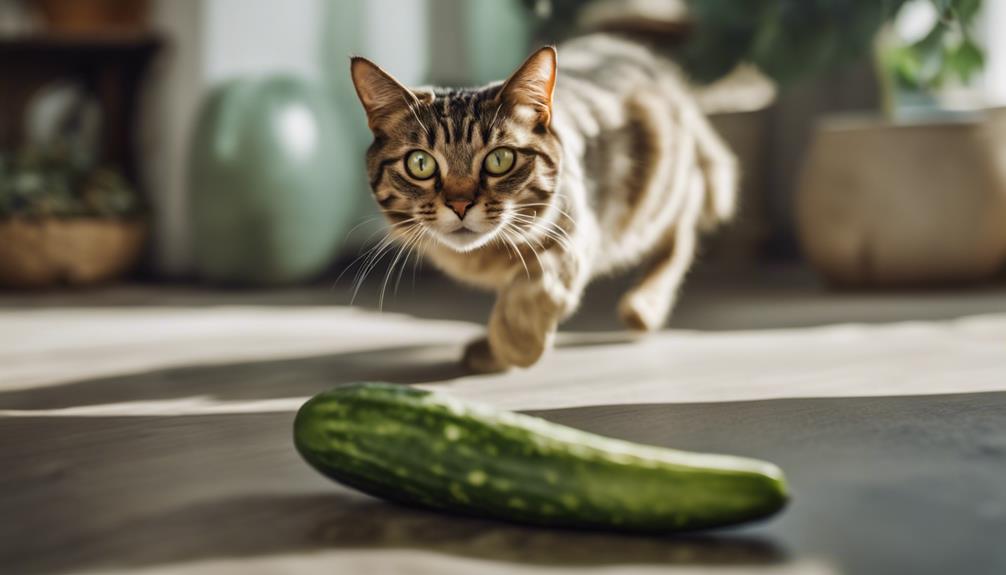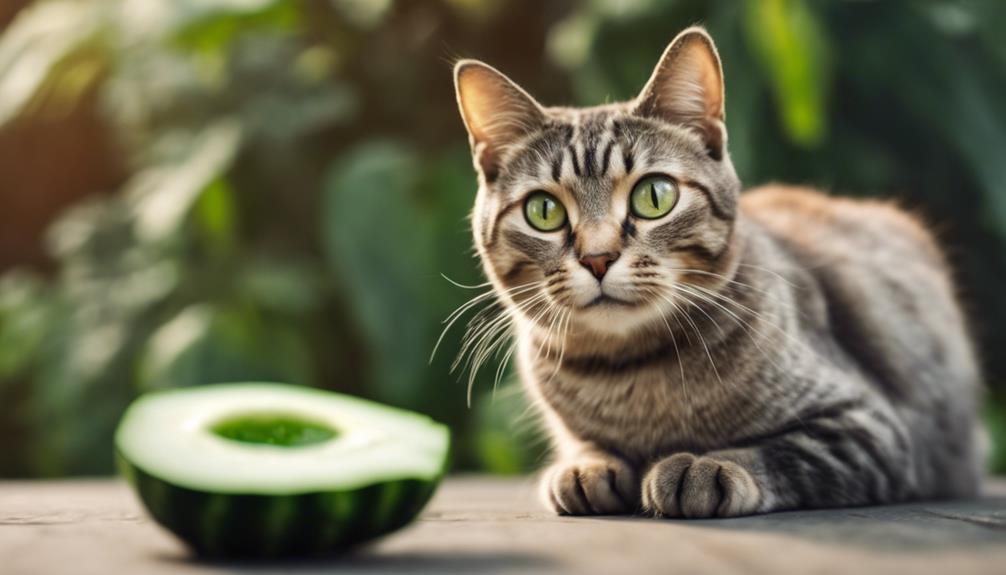The enigmatic fear that cats exhibit towards cucumbers has sparked curiosity among many feline enthusiasts. With a keen focus on the insights provided by veterinarians, a nuanced understanding of this intriguing behavior begins to unfold.
By peeling back the layers of cats' innate instincts and perceptual responses, we start to discern the intricate reasons behind their seemingly disproportionate reactions to this humble vegetable.
As we delve into the complexities of feline psychology, a glimpse into the intricate world of cat cognition emerges, offering a glimpse into the mysterious interplay between cats and cucumbers.
Key Takeaways
- Cats may mistake cucumbers for snakes, triggering their instinct to jump away.
- Avoid scaring cats as it can lead to prolonged nervousness and distrust.
- Cats react to unfamiliar objects visually causing alarm or fear.
- Engaging cats in play with toys is more beneficial than scaring them.
Cats' Fear of Cucumbers Explained
The rationale behind cats' fear of cucumbers stems from their innate tendency to perceive the elongated, green objects as potential threats akin to snakes, triggering a reflexive jump response. This reaction is likely an evolutionary adaptation where cats instinctively associate unfamiliar, elongated shapes with danger.
Veterinarians explain that startling cats with cucumbers can lead to unnecessary stress and fear, impacting their trust in their surroundings. Cats' acute senses, particularly their sight and smell, play a significant role in how they perceive their environment.
Understanding and respecting cats' natural behaviors, such as their aversion to sudden surprises, can help foster a harmonious relationship with our feline companions. Engaging cats through interactive play with appropriate toys is a more positive way to stimulate their natural instincts and provide mental and physical enrichment.
Veterinarians' Insights on Cat Behavior
Insights from veterinarians shed light on the intricate behaviors of cats, offering valuable perspectives for understanding and caring for our feline companions.
- Importance of Enrichment Activities: Providing cats with mental and physical stimulation is crucial for their overall well-being.
- Signs of Stress in Cats: Veterinarians highlight the importance of recognizing signs of stress in cats, such as hiding, excessive grooming, or changes in appetite.
- Communication Through Body Language: Understanding feline body language can help decipher their emotions and improve the human-cat bond.
Impact of Scaring Cats Unintentionally

Implications arise when cats are inadvertently subjected to fear-inducing stimuli, potentially impacting their emotional well-being and trust in their environment. These unintended scares can lead to long-lasting effects on a cat's mental state and behavior towards their surroundings. It is crucial for pet owners to be mindful of the potential consequences of startling their feline companions, as trust and security are fundamental to a cat's overall well-being.
| Effects of Unintentional Scaring on Cats | ||
|---|---|---|
| Increased Stress Levels | ||
| Behavioral Changes | ||
| Decreased Trust in Environment |
Engaging Play for Cat Well-being
Engaging in interactive play activities is essential for promoting the well-being and mental health of cats. When it comes to ensuring your feline companion's happiness, incorporating playtime into their routine is crucial. Here are three key benefits of engaging play for cat well-being:
- Physical Exercise: Regular play sessions help cats maintain a healthy weight, improve muscle tone, and prevent obesity-related health issues.
- Mental Stimulation: Interactive toys and games stimulate cats' natural hunting instincts, keeping their minds active and preventing boredom.
- Bonding Opportunity: Playtime strengthens the bond between cats and their owners, fostering trust and enhancing the overall relationship.
Unveiling Interesting Cat Facts

Exploring the intriguing world of feline behavior and characteristics, it becomes evident that cats possess a multitude of fascinating traits and abilities, including their capacity to remember people and their emotional sensitivity. Contrary to popular belief, cats likely dream, displaying complex cognitive processes during sleep.
Additionally, cats may exhibit peculiar behavior like eating plastic, often attributed to conditions such as pica. Their ability to recall people showcases a level of cognitive function that goes beyond mere instinct. While some may speculate about cats seeing ghosts, experts debunk this myth, emphasizing the importance of monitoring signs of eye infections in felines.
Furthermore, the remarkable sensitivity of cats to human emotions, such as sadness, solidifies the unique bond between cats and their human companions.
Conclusion
In conclusion, the enigmatic fear of cucumbers in cats reveals a world of feline behavior shrouded in intrigue and mystery. Through the astute observations of veterinarians, we glimpse into the intricate dynamics that govern our beloved pets' reactions.
The simple act of placing a cucumber can evoke startling responses that highlight the profound instincts and sensory perceptions of cats. This revelation underscores the importance of understanding and respecting our feline companions' unique needs and preferences with exaggerated curiosity and amusement.




